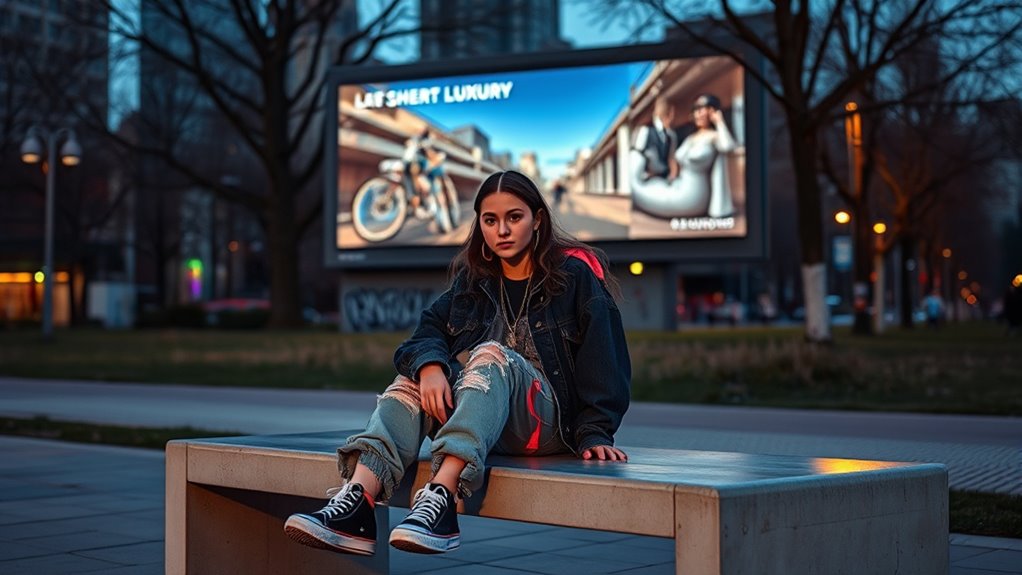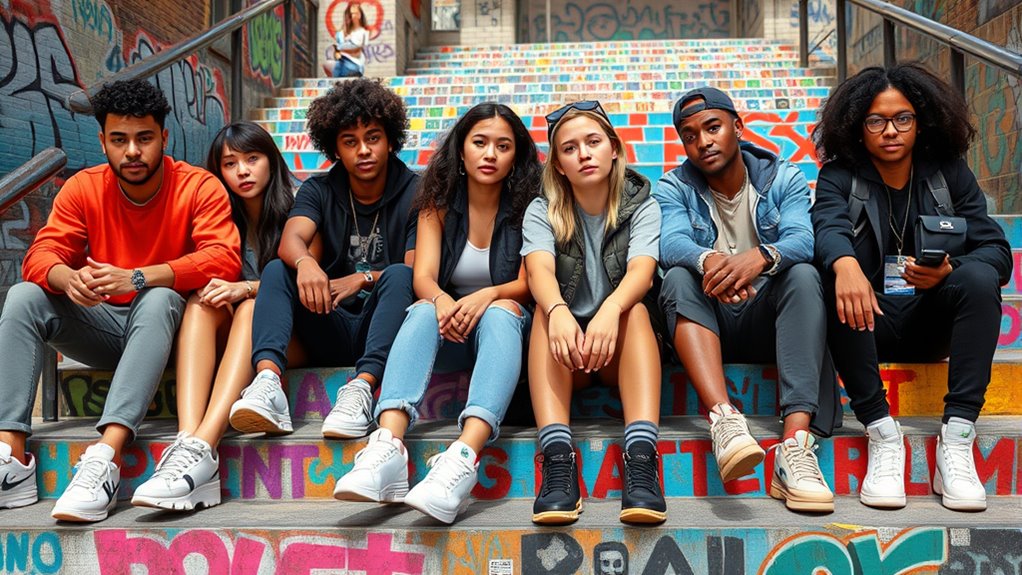If you’re clinging to old luxury stories rooted in heritage and exclusivity, you’ll find Gen Z increasingly uninterested. They prioritize authenticity, transparency, and brands that reflect their values around sustainability and ethical practices. Digital platforms, micro-influencers, and virtual experiences now shape their perceptions of luxury. To stay relevant, you need to embrace a fresh, values-driven approach that focuses on personal relevance and digital engagement. Keep exploring to discover how brands are transforming to catch Gen Z’s attention.

Are luxury stories rooted in heritage and exclusivity losing their appeal to today’s young consumers? If you’re a brand relying solely on tradition and legacy to attract buyers, you might be missing the mark. Recent data shows that over 70% of Gen Z prioritize brands that reflect their personal values and identity over those with a long-standing heritage. They aren’t impressed by the same exclusivity that once defined luxury; instead, they look for authenticity, transparency, and relevance. Digital platforms have replaced traditional exclusivity as the primary luxury indicator. Think of TikTok unboxing videos or Instagram limited drops—these generate buzz and desirability far more effectively than private club invitations or secret societies. Micro-influencers now hold more sway than celebrities for luxury endorsements—by 67%, Gen Z trusts these smaller, more relatable voices over traditional stars. Furthermore, AI technologies are increasingly used to create personalized experiences that resonate with this generation’s values.
Luxury brands must recognize that exclusivity doesn’t solely mean social gatekeeping anymore. Algorithms, invite-only digital events, and virtual platforms now craft a new sense of privilege. It’s about feeling special in a digital space, not just on a private club’s guest list. For Gen Z, luxury is about stories of sustainability and transparency. They want to see a brand’s commitment to environmental and social issues—something that’s increasingly more important than the product itself. More than half of European Gen Z consumers prefer to buy from brands with strong environmental commitments, and the secondhand luxury market is booming, growing 65% faster than first-hand purchases. They’re willing to pay a premium for ethically produced goods, especially when resale platforms like Depop or Vestiaire Collective make recirculating luxury items easy. In fact, the secondhand luxury market is projected to reach $68 billion globally by 2025, reflecting shifting consumer values.
Gen Z’s approach to luxury is also about experience and engagement. They value seamless transactions and tech-driven payment options like Buy Now Pay Later. Virtual try-ons, augmented reality, and gamified experiences aren’t just trends—they’re essentials for capturing their attention. Authentic community-building and user-generated content matter more than traditional advertising, creating a sense of belonging and trust. Conspicuous consumption is declining as this generation becomes more climate-conscious and aware of economic uncertainties. They see luxury less as a symbol of wealth and more as a reflection of personal values, favoring “quiet luxury” that emphasizes quality over ostentation.
Digital and social media play a pivotal role in shaping luxury access. Limited virtual drops, NFTs, and digital collectibles—like Gucci’s Roblox bag—are redefining ownership. Some of these digital luxury items sell for more than physical counterparts, illustrating that for Gen Z, value isn’t just in the material but in the story, experience, and context behind it. If brands want to stay relevant, they need to abandon old narratives rooted solely in heritage and embrace a new, values-driven, digitally savvy approach.
Frequently Asked Questions
How Can Luxury Brands Innovate to Appeal to Gen-Z?
To appeal to Gen Z, innovate by emphasizing sustainability and ethical practices, showing transparency in sourcing and production. Engage digitally with authentic content on social media, using influencers and immersive experiences. Offer inclusive, customizable products that break traditional norms, like gender-fluid options or limited editions. Rethink storytelling around social impact and environmental responsibility rather than heritage, and create accessible luxury options that balance quality with affordability to resonate with their values and lifestyles.
What New Marketing Strategies Attract Gen-Z Luxury Consumers?
You can capture Gen-Z’s attention by turning marketing into an immersive adventure, like stepping into a vibrant storybook. Use authentic social media content, short-form videos, and gamified virtual experiences to create a buzz. Personalize every touchpoint with AI-driven insights and embrace digital exclusives like NFTs. Prioritize inclusivity and values, making your brand a reflection of their identity, so they feel emotionally connected and enthusiastic to engage with your luxury offerings.
How Does Social Media Influence Gen-Z’s Luxury Brand Preferences?
You see, social media shapes your luxury brand preferences by emphasizing authenticity, sustainability, and community. You’re drawn to brands that showcase ethical practices and connect with your values through engaging content from influencers and real users. You prefer immersive experiences like AR filters and digital events, which make you feel involved and valued. This digital landscape helps you redefine luxury as personal, responsible, and aligned with your identity, not just status symbols.
What Sustainable Practices Resonate Most With Gen-Z Luxury Buyers?
Think of sustainability as a shining beacon guiding your luxury choices. You value brands that share transparent supply chains, ensuring fair labor and eco-friendly materials. Circular fashion and second-hand finds symbolize your commitment to reducing waste and extending product life. You’re willing to pay more for durability, personalization, and brands that openly report progress on their green goals. These practices reflect your desire for authenticity, responsibility, and a meaningful connection to luxury’s future.
How Important Is Authenticity in Luxury Branding to Gen-Z?
Authenticity is essential for you when choosing luxury brands. You look for genuine alignment with social and environmental values, not superficial messaging. You want brands that demonstrate real sustainability, responsible practices, and shared principles. Deep connections matter more than just owning products; you seek emotional resonance and meaningful experiences. If brands fail to be authentic, you quickly lose trust and interest, making authenticity a key driver in your loyalty and purchasing decisions.
Conclusion
If you want to truly capture Gen-Z’s attention, you can’t just tell them the same old luxury stories. They crave authenticity, innovation, and meaning—a revolution in storytelling that feels as fresh as a sunrise. If you fail to adapt, you’ll be left in the dust, forgotten in a blink. This generation’s hunger for something real is unstoppable; miss out, and you risk being just another fading echo in the luxury world’s history.










